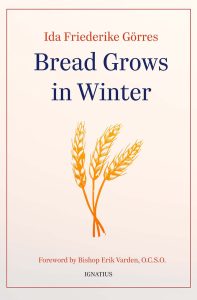Life Illumined
Bread Grows in Winter
I’ve just received in the mail Jennifer Bryson’s translation of Ida Görres’s seminal book Bread Grows in Winter, handsomely published by Ignatius Press. I was honoured to be asked to contribute a preface. Here it is:
I picked up a battered German copy of Ida Görres’s Bread Grows in Winter from a junk shop years ago. This book, first published in 1970, has been a source of inspiration to me. During my first few years of episcopacy I often took it with me on journeys, as a travel  companion. Trying to work out how to exercise the ministry, I found in Görres a sure guide unfailingly summoning me to focus on essentials.
companion. Trying to work out how to exercise the ministry, I found in Görres a sure guide unfailingly summoning me to focus on essentials.
Ida Görres was a woman of acute intelligence, able to fathom in herself great tensions. Her bicultural background kept her from simplifying questions of identity, cultural or ecclesiastical. When the Second Vatican Council began, she followed it enthusiastically. She remained committed to the Council’s teaching, but was increasingly appalled by the crassness with which it was instrumentalised, here and there, as an excuse for mere deconstruction. She saw spiritual and intellectual treasures being thrown overboard as the bark of the Church made its way through choppy waters. This made her grieve both on her own behalf and on that of others.
Of course, she had read enough Church history to know that such losses are never final. There will always be pearl-divers ready to descend to the bottom of the sea to fetch treasures up again, patiently removing strings of algae as they rejoice in sharing their finds. But why go to such trouble when a peaceful handing-on (in Latin, a traditio) in view of present mission and future growth remains an option?
It would be a mistake to present Ida Görres as just an antiquarian. Her concern was theological. She insisted, as had the Council Fathers in their constitution Lumen Gentium, that the Church must be understood as a sacramental, personal reality. Görres  regretted the eclipse of theology in much that was said about the Church, and done to her in consequence, in the heady years of the late 60s, with the West caught up in a cultural revolution that unfolded, often enough, as a targeted assault on institutions. The Church, she kept repeating, can neither be rightly understood nor truly loved by one who regards her in institutional terms while failing to recognise her as ‘the strangest creation of God, so unique in kind, so large, so contradictory, so colourful that no single person can take stock of her and figure her out, and certainly no outsider can ever take her all in, let alone understand her and judge her’.
regretted the eclipse of theology in much that was said about the Church, and done to her in consequence, in the heady years of the late 60s, with the West caught up in a cultural revolution that unfolded, often enough, as a targeted assault on institutions. The Church, she kept repeating, can neither be rightly understood nor truly loved by one who regards her in institutional terms while failing to recognise her as ‘the strangest creation of God, so unique in kind, so large, so contradictory, so colourful that no single person can take stock of her and figure her out, and certainly no outsider can ever take her all in, let alone understand her and judge her’.
For much too long, the theology of Ida Görres has been a minority interest passed on among initiates who recognise each other, as it were, by way of secret handshakes or knowing looks. I rejoice that these boundaries are bursting. The publication of Görres’s work in English is a major event full of promise for the Church’s mission, at once ancient and ever new, ‘to carry forward the work of Christ under the lead of the befriending Spirit’.
